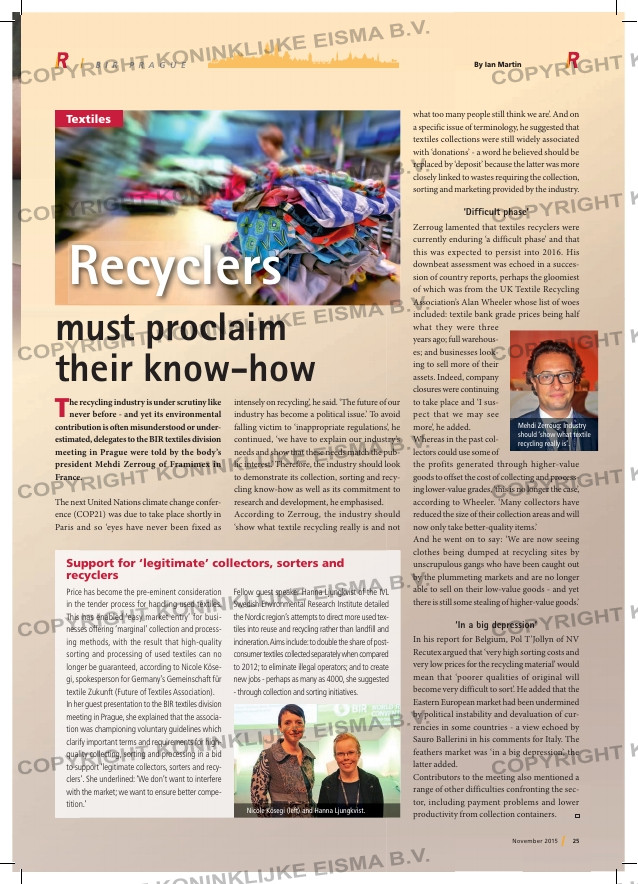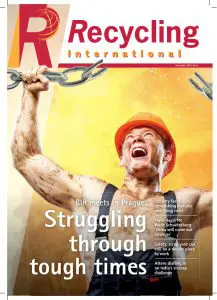Page 27 from: November 2015

25November 2015
B I R P R A G U E
The recycling industry is under scrutiny like never before – and yet its environmental
contribution is often misunderstood or under-
estimated, delegates to the BIR textiles division
meeting in Prague were told by the body’s
president Mehdi Zerroug of Framimex in
France.
The next United Nations climate change confer-
ence (COP21) was due to take place shortly in
Paris and so ‘eyes have never been fixed as
intensely on recycling’, he said. ‘The future of our
industry has become a political issue.’ To avoid
falling victim to ‘inappropriate regulations’, he
continued, ‘we have to explain our industry’s
needs and show that these needs match the pub-
lic interest.’ Therefore, the industry should look
to demonstrate its collection, sorting and recy-
cling know-how as well as its commitment to
research and development, he emphasised.
According to Zerroug, the industry should
‘show what textile recycling really is and not
what too many people still think we are’. And on
a specific issue of terminology, he suggested that
textiles collections were still widely associated
with ‘donations’ – a word he believed should be
replaced by ‘deposit’ because the latter was more
closely linked to wastes requiring the collection,
sorting and marketing provided by the industry.
‘Difficult phase’
Zerroug lamented that textiles recyclers were
currently enduring ‘a difficult phase’ and that
this was expected to persist into 2016. His
downbeat assessment was echoed in a succes-
sion of country reports, perhaps the gloomiest
of which was from the UK Textile Recycling
Association’s Alan Wheeler whose list of woes
included: textile bank grade prices being half
what they were three
years ago; full warehous-
es; and businesses look-
ing to sell more of their
assets. Indeed, company
closures were continuing
to take place and ‘I sus-
pect that we may see
more’, he added.
Whereas in the past col-
lectors could use some of
the profits generated through higher-value
goods to offset the cost of collecting and process-
ing lower-value grades, ‘this is no longer the case’,
according to Wheeler. ‘Many collectors have
reduced the size of their collection areas and will
now only take better-quality items.’
And he went on to say: ‘We are now seeing
clothes being dumped at recycling sites by
unscrupulous gangs who have been caught out
by the plummeting markets and are no longer
able to sell on their low-value goods – and yet
there is still some stealing of higher-value goods.’
‘In a big depression’
In his report for Belgium, Pol T’Jollyn of NV
Recutex argued that ‘very high sorting costs and
very low prices for the recycling material’ would
mean that ‘poorer qualities of original will
become very difficult to sort’. He added that the
Eastern European market had been undermined
by political instability and devaluation of cur-
rencies in some countries – a view echoed by
Sauro Ballerini in his comments for Italy. The
feathers market was ‘in a big depression’, the
latter added.
Contributors to the meeting also mentioned a
range of other difficulties confronting the sec-
tor, including payment problems and lower
productivity from collection containers.
By Ian Martin
Textiles
Mehdi Zerroug: Industry
should ‘show what textile
recycling really is’.
Support for ‘legitimate’ collectors, sorters and
recyclers
Price has become the pre-eminent consideration
in the tender process for handling used textiles.
This has enabled ‘easy market entry’ for busi-
nesses offering ‘marginal’ collection and process-
ing methods, with the result that high-quality
sorting and processing of used textiles can no
longer be guaranteed, according to Nicole Köse-
gi, spokesperson for Germany’s Gemeinschaft für
textile Zukunft (Future of Textiles Association).
In her guest presentation to the BIR textiles division
meeting in Prague, she explained that the associa-
tion was championing voluntary guidelines which
clarify important terms and requirements for high-
quality collecting, sorting and processing in a bid
to support ‘legitimate collectors, sorters and recy-
clers’. She underlined: ‘We don’t want to interfere
with the market; we want to ensure better compe-
tition.’
Fellow guest speaker Hanna Ljungkvist of the IVL
Swedish Environmental Research Institute detailed
the Nordic region’s attempts to direct more used tex-
tiles into reuse and recycling rather than landfill and
incineration. Aims include: to double the share of post-
consumer textiles collected separately when compared
to 2012; to eliminate illegal operators; and to create
new jobs – perhaps as many as 4000, she suggested
– through collection and sorting initiatives.
Nicole Kösegi (left) and Hanna Ljungkvist.
Knowledge transfer
vital for recycling
car plastics Recyclers
must proclaim
their know-how



